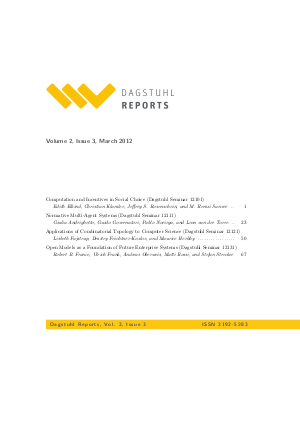Dagstuhl Reports, Volume 2, Issue 3
-
Part of:
Volume:
Dagstuhl Reports, Volume 2
Journal: Dagstuhl Reports (DagRep)

Event
- Dagstuhl Seminars 12101, 12111, 12121, 12131
Publication Details
- published at: 2012-09-06
- Publisher: Schloss Dagstuhl – Leibniz-Zentrum für Informatik
- DBLP: db/journals/dagstuhl-reports/dagstuhl-reports2
Access Numbers
- Detailed Access Statistics available here
-
Total Document Accesses (updated on a weekly basis):
0PDF Downloads
Documents
Dagstuhl Reports, Volume 2, Issue 3, March 2012, Complete Issue
Abstract
Cite as
Dagstuhl Reports, Volume 2, Issue 3, Schloss Dagstuhl – Leibniz-Zentrum für Informatik (2012)
Copy BibTex To Clipboard
@Article{DagRep.2.3,
title = {{Dagstuhl Reports, Volume 2, Issue 3, March 2012, Complete Issue}},
journal = {Dagstuhl Reports},
ISSN = {2192-5283},
year = {2012},
volume = {2},
number = {3},
publisher = {Schloss Dagstuhl -- Leibniz-Zentrum f{\"u}r Informatik},
address = {Dagstuhl, Germany},
URL = {https://drops.dagstuhl.de/entities/document/10.4230/DagRep.2.3},
URN = {urn:nbn:de:0030-drops-35396},
doi = {10.4230/DagRep.2.3},
annote = {Keywords: Dagstuhl Reports, Volume 2, Issue 3, March 2012, Complete Issue}
}
Dagstuhl Reports, Table of Contents, Volume 2, Issue 3, 2012
Abstract
Cite as
Dagstuhl Reports, Volume 2, Issue 3, pp. i-ii, Schloss Dagstuhl – Leibniz-Zentrum für Informatik (2012)
Copy BibTex To Clipboard
@Article{DagRep.2.3.i,
title = {{Dagstuhl Reports, Table of Contents, Volume 2, Issue 3, 2012}},
pages = {i--ii},
journal = {Dagstuhl Reports},
ISSN = {2192-5283},
year = {2012},
volume = {2},
number = {3},
publisher = {Schloss Dagstuhl -- Leibniz-Zentrum f{\"u}r Informatik},
address = {Dagstuhl, Germany},
URL = {https://drops.dagstuhl.de/entities/document/10.4230/DagRep.2.3.i},
URN = {urn:nbn:de:0030-drops-35380},
doi = {10.4230/DagRep.2.3.i},
annote = {Keywords: Dagstuhl Reports, Table of Contents, Volume 2, Issue 3, 2012}
}
Computation and Incentives in Social Choice (Dagstuhl Seminar 12101)
Abstract
Cite as
Edith Elkind, Christian Klamler, Jeffrey S. Rosenschein, and M. Remzi Sanver. Computation and Incentives in Social Choice (Dagstuhl Seminar 12101). In Dagstuhl Reports, Volume 2, Issue 3, pp. 1-22, Schloss Dagstuhl – Leibniz-Zentrum für Informatik (2012)
Copy BibTex To Clipboard
@Article{elkind_et_al:DagRep.2.3.1,
author = {Elkind, Edith and Klamler, Christian and Rosenschein, Jeffrey S. and Sanver, M. Remzi},
title = {{Computation and Incentives in Social Choice (Dagstuhl Seminar 12101)}},
pages = {1--22},
journal = {Dagstuhl Reports},
ISSN = {2192-5283},
year = {2012},
volume = {2},
number = {3},
editor = {Elkind, Edith and Klamler, Christian and Rosenschein, Jeffrey S. and Sanver, M. Remzi},
publisher = {Schloss Dagstuhl -- Leibniz-Zentrum f{\"u}r Informatik},
address = {Dagstuhl, Germany},
URL = {https://drops.dagstuhl.de/entities/document/10.4230/DagRep.2.3.1},
URN = {urn:nbn:de:0030-drops-35322},
doi = {10.4230/DagRep.2.3.1},
annote = {Keywords: Computational Social Choice, Voting, Incentives, Algorithmic Game Theory}
}
Normative Multi-Agent Systems (Dagstuhl Seminar 12111)
Abstract
Cite as
Giulia Andrighetto, Guido Governatori, Pablo Noriega, and Leon van der Torre. Normative Multi-Agent Systems (Dagstuhl Seminar 12111). In Dagstuhl Reports, Volume 2, Issue 3, pp. 23-49, Schloss Dagstuhl – Leibniz-Zentrum für Informatik (2012)
Copy BibTex To Clipboard
@Article{andrighetto_et_al:DagRep.2.3.23,
author = {Andrighetto, Giulia and Governatori, Guido and Noriega, Pablo and van der Torre, Leon},
title = {{Normative Multi-Agent Systems (Dagstuhl Seminar 12111)}},
pages = {23--49},
journal = {Dagstuhl Reports},
ISSN = {2192-5283},
year = {2012},
volume = {2},
number = {3},
editor = {Andrighetto, Giulia and Governatori, Guido and Noriega, Pablo and van der Torre, Leon},
publisher = {Schloss Dagstuhl -- Leibniz-Zentrum f{\"u}r Informatik},
address = {Dagstuhl, Germany},
URL = {https://drops.dagstuhl.de/entities/document/10.4230/DagRep.2.3.23},
URN = {urn:nbn:de:0030-drops-35358},
doi = {10.4230/DagRep.2.3.23},
annote = {Keywords: Normative Multiagent systems, Autonomous agents and Multiagent systems, Agreement Technologies, Norms}
}
Applications of Combinatorial Topology to Computer Science (Dagstuhl Seminar 12121)
Abstract
Cite as
Lisbeth Fajstrup, Dmitry Feichtner-Kozlov, and Maurice Herlihy. Applications of Combinatorial Topology to Computer Science (Dagstuhl Seminar 12121). In Dagstuhl Reports, Volume 2, Issue 3, pp. 50-66, Schloss Dagstuhl – Leibniz-Zentrum für Informatik (2012)
Copy BibTex To Clipboard
@Article{fajstrup_et_al:DagRep.2.3.50,
author = {Fajstrup, Lisbeth and Feichtner-Kozlov, Dmitry and Herlihy, Maurice},
title = {{Applications of Combinatorial Topology to Computer Science (Dagstuhl Seminar 12121)}},
pages = {50--66},
journal = {Dagstuhl Reports},
ISSN = {2192-5283},
year = {2012},
volume = {2},
number = {3},
editor = {Fajstrup, Lisbeth and Feichtner-Kozlov, Dmitry and Herlihy, Maurice},
publisher = {Schloss Dagstuhl -- Leibniz-Zentrum f{\"u}r Informatik},
address = {Dagstuhl, Germany},
URL = {https://drops.dagstuhl.de/entities/document/10.4230/DagRep.2.3.50},
URN = {urn:nbn:de:0030-drops-35363},
doi = {10.4230/DagRep.2.3.50},
annote = {Keywords: Combinatorial topology, Distributed computing, Persistent homology, Program semantics, Sensor networks}
}
Open Models as a Foundation of Future Enterprise Systems (Dagstuhl Seminar 12131)
Abstract
Cite as
Robert B. France, Ulrich Frank, Andreas Oberweis, Matti Rossi, and Stefan Strecker. Open Models as a Foundation of Future Enterprise Systems (Dagstuhl Seminar 12131). In Dagstuhl Reports, Volume 2, Issue 3, pp. 67-85, Schloss Dagstuhl – Leibniz-Zentrum für Informatik (2012)
Copy BibTex To Clipboard
@Article{france_et_al:DagRep.2.3.67,
author = {France, Robert B. and Frank, Ulrich and Oberweis, Andreas and Rossi, Matti and Strecker, Stefan},
title = {{Open Models as a Foundation of Future Enterprise Systems (Dagstuhl Seminar 12131)}},
pages = {67--85},
journal = {Dagstuhl Reports},
ISSN = {2192-5283},
year = {2012},
volume = {2},
number = {3},
editor = {France, Robert B. and Frank, Ulrich and Oberweis, Andreas and Rossi, Matti and Strecker, Stefan},
publisher = {Schloss Dagstuhl -- Leibniz-Zentrum f{\"u}r Informatik},
address = {Dagstuhl, Germany},
URL = {https://drops.dagstuhl.de/entities/document/10.4230/DagRep.2.3.67},
URN = {urn:nbn:de:0030-drops-35379},
doi = {10.4230/DagRep.2.3.67},
annote = {Keywords: Enterprise Modelling, Enterprise Systems, Reference Model, Meta Modeling, Method Engineering, Information Systems Architectures}
}